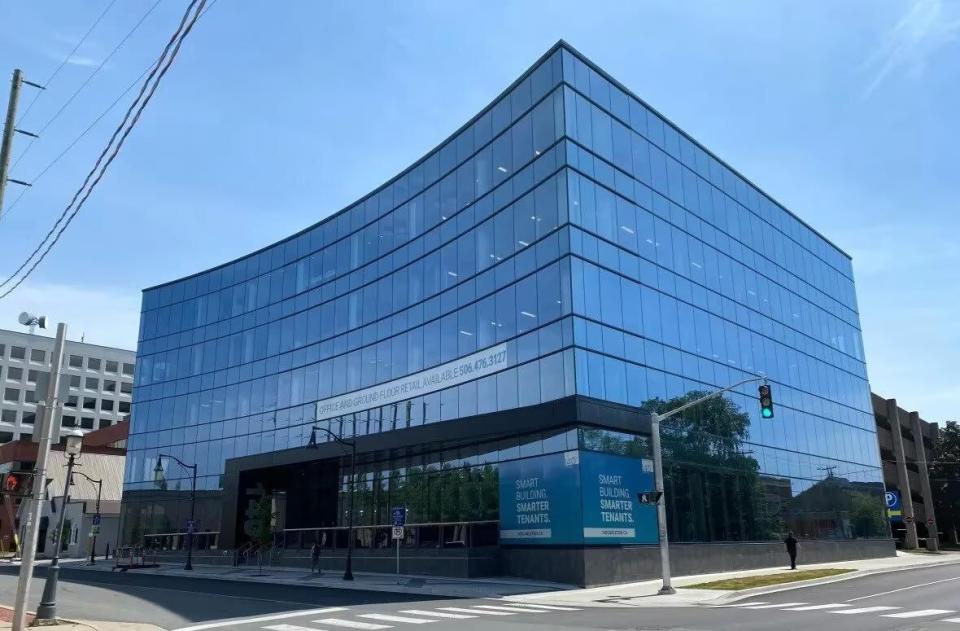Pension deal with province in 2014 did not plan for large cost-of-living increases

Krista Richard retired from 36 years of teaching in Moncton two years ago and although she says she hasn't noticed the effects yet, the value of her pension has already been slowly eroding.
"I'm doing fine, said Richard.
"I've always watched my finances. I don't smoke, I don't drink, I save my money. My car is paid off. I sold my house and bought a little townhouse. So, so far it's been livable."
Since Richard left work in mid-2021, the cost of living in New Brunswick has increased more than 12 per cent, an escalation the province's pension plan for teachers was not designed to deal with.

New Brunswick teachers negotiated weaker inflation protections for their retirees than civil servants did when pensions were converted to shared-risk plans in 2014. (Ben Nelms/Radio-Canada)
Under the terms of the teachers' shared-risk pension plan, which was negotiated with the New Brunswick government in 2014, retirees like Richard will receive a partial cost-of-living increase in their pension in January. That will cover 64 per cent of the inflation that has occurred in the past year.
It's the second year in a row that the cost of living increase paid to retired teachers will fall below 70 per cent of the inflation rate.
By contrast, retired New Brunswick government civil servants — including retired MLAs and cabinet ministers — will receive pension adjustments in January that cover 95 per cent of the inflation rate.
Larry Jamieson is chair of the board of trustees of the teachers' pension plan. During an October information meeting for teachers, he explained that although inflation adjustments for retirees have been well below the cost of living for the last two years, they are all that is allowed under the plan teachers agreed to back in 2014.
"This is the maximum that can be provided based upon the plan's cap, per the governing documents of the plan," said Jamieson.

New Brunswick teachers have a $6.4-billion pension fund that is managed by Vestcor, which operates out of this Fredericton office building. Over the past 10 years, the fund has earned an annual average return of 7.3 per cent. That's average for Canadian pension funds but a full per cent below returns earned by the Ontario teacher's pension fund, which this year is paying its retired teachers a full cost of living increase (Joe McDonald/CBC)
New Brunswick has two major pension plans for government employees, including one specifically for teachers and one for civil servants, crown corporation employees, MLAs and a variety of other employees.
A number of smaller plans serve other employee groups.
In 2014, the New Brunswick government, led by then-finance minister Blaine Higgs, pushed to transform the plans into what was called a "shared-risk" model, where government would no longer be required to fund pension deficits if the cost of retirement benefits outstripped the plans' ability to pay for them.
The larger civil service plan was set up first and includes full inflation protection for retirees, if funding levels in the pension plan remain high enough to afford it.
However, the teachers' plan agreed to limit cost of living protections for their retirees to 75 per cent of the rate in inflation. They also agreed to a hard cap of 3.56 per cent on an inflation increase in any year that inflation exceeds 4.75 per cent.

Blaine Higgs was New Brunswick's finance minister in 2014 when he negotiated a new pension deal with teachers that watered down the right to inflation increases for retired educators. (Paul Hantiuk/CBC)
In explaining how that difference was arrived at, Higgs told the legislature in 2014 that teachers themselves pushed to water down inflation protections for retirees to preserve other benefits in their plan, such as early retirement provisions.
"The teachers came with a solution that would work for them and with a plan for their priorities and where they wanted to place them," said Higgs during debate of the bill that created the new shared-risk pension for teachers.
"You will see that what they accepted was an intergenerational solution that the retirees were prepared to work with because they, too, wanted to be part of this solution."
During those 2014 negotiations, interest rates had been hovering below one per cent. During last year's information meeting with teachers, Jamieson acknowledged those who worked on the pension deal with the province did not plan for a high inflation scenario.
"At the time of conversion, in fact for the past 30 years, we've not been in a period of high inflation like we've been for the last year or so. It wasn't a high priority item at the time," he said.
That decision is now having a significant effect on pension values.
In January, retired New Brunswick teachers will see a 3.56 per cent increase in benefits to offset a 5.59 per cent increase in the cost of living, as measured between June 2022 and June 2023.
Last January, they received the same 3.56 per cent increase to offset an almost identical inflationary increase of 5.56 per cent from a year earlier.
Meanwhile retired civil servants, crown corporation employees, MLAs and others in the civil service plan received a 5.24 per cent inflation increase last January and are scheduled to receive 5.32 per cent this January, amounts that are both just short of full inflation.
That means a retired teacher with an average $35,000 annual pension in 2022 will see that increased by $2,236 in 2024. That's well behind the $3,793 increase retired civil servants who had the same $35,000 pension in 2022 have been awarded.
Richard said she finds it difficult to complain about that because she is grateful to have a pension when so many others don't and said if it continues lose value over time, she will deal with that as best she can.
"I can't predict what's going to happen next year or two years. I just take it as it comes," she said.


